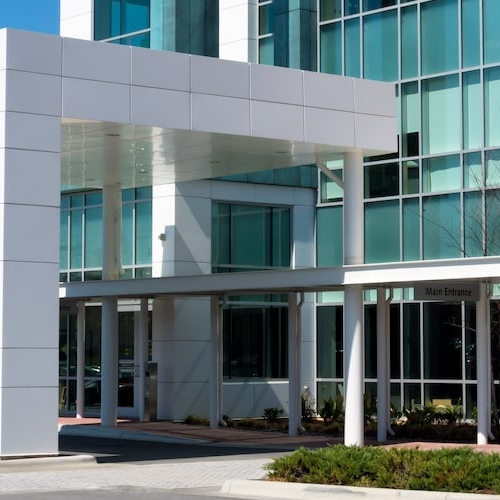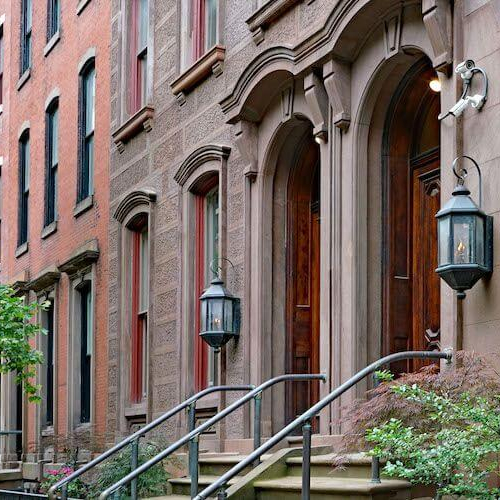FHA commercial loan programs: An introduction
Contributed by Karen Idelson
Dec 6, 2025
•5-minute read

Borrowers typically use loans insured by the Federal Housing Administration to finance the purchase of residential homes. And, because FHA loans require low down payments of 3.5% of your loan amount if your FICO credit score is at least 580, many borrowers who are low on available cash use these loans to purchase starter homes.
But you can also use an FHA loan to finance the purchase of a commercial property if you follow the housing administration's strict rules, one of which states that the property you buy must have a residential component in addition to any commercial uses. You must also follow local zoning laws.
FHA commercial property loan basics
It is possible to finance the purchase of a commercial property with an FHA loan. But the property must usually contain at least some residential space, and you must live in that space as your primary residence.
The FHA’s commercial loans fall under its Multifamily Programs division. While the FHA doesn’t originate loans, it does insure them. If you want to apply for an FHA-insured loan to purchase a commercial building that contains some residential use, you’d work with a private mortgage lender. The lender would originate the loan, while the FHA will insure it, providing a financial safety net to your lender if you fail to make your payments on time.
Taking out a commercial loan with the FHA can be confusing, though, because of the FHA’s definition of which properties fit under its single-family home residential loan category. You might think of a duplex, triplex, or quadplex as a multifamily home. The FHA doesn’t necessarily define these properties as single-family homes, but you can use the same FHA loan program that borrowers use when buying single-family homes to finance the purchase of multifamily properties with up to four units.
The key: Borrowers who use an FHA-insured mortgage to buy one of these smaller apartment properties must also live in at least one of the units as their primary residence for at least one year. Buying one of these properties with a single-family FHA loan and renting out the units in which you don’t live is one way you can buy what most people consider a commercial property that can earn you income.
FHA loan requirements for mixed-use properties
You can also take out an FHA-insured mortgage through the administration’s multifamily division if you want to buy a mixed-use property that includes a mix of residential and commercial spaces, such as a building with a convenience store and dry cleaner on the first floor and two apartment units above it.
There are some restrictions, though. In using an FHA-insured loan to buy one of these properties. The most important: At least 51% of the mixed-use property’s space must be devoted to residential.
Also, you can only finance the purchase of a mixed-use commercial property with an FHA loan if you live in that space as your primary residence for at least one year.
The FHA also imposes a self-sufficiency test. You must prove that 75% of the rental income from all units in a mixed-use building, including yours, will cover your monthly mortgage payment. If you can’t pass this test, you won’t qualify for an FHA loan for your mixed-use property.
Commercial properties that qualify for FHA financing
The FHA insures commercial loans for three types of both for-profit and nonprofit multifamily residential properties. With these commercial properties, the residency rule is not required. The owners of these properties do not have to live in the facility.
- Health care facilities: HUD's Office of Healthcare Programs administers the FHA's healthcare programs division, which provides mortgage insurance for both residential care facilities and hospitals. HUD says that since 1959, more than 8,600 mortgage insurance commitments have been issued in the country under this program to help finance the construction, renovation, acquisition, or refinancing of healthcare facilities.
- Purchase or Refinancing of Existing Multifamily Rental Housing (Section 207 and Section 223(f)): Under this program, the FHA insures mortgages for borrowers purchasing or refinancing existing multifamily rental housing. Borrowers can apply for long-term mortgages of up to 35 years. Properties must contain five residential units with complete kitchens and baths.
- Rental and Cooperative Housing (Section 221(d)(3) and Section 221(d)(4)): Through this program, the FHA insures mortgage loans for the construction or substantial rehabilitation of multifamily rental or cooperative housing for moderate-income families, elderly residents, and handicapped residents. Properties must have five or more units.
- Rental Housing for the Elderly (S231): This program insures mortgages that are used for the construction and substantial rehabilitation of multifamily rental housing for people 62 or older and people with disabilities.
The FHA also insures mortgages that are available to nonprofits working in the fields of elderly housing (Section 202) and special needs housing (Section 811).
FAQ
Can I buy a commercial property with an FHA loan?
You can use an FHA loan to finance the purchase of health care facilities and existing multifamily rental housing.
Can FHA commercial loans be used for mixed-use properties?
Yes, you can finance the purchase of a mixed-use property as long as at least 51% of the property is devoted to residential use. The buyer must also live in the property as a primary residence and occupy it within 60 days.
What are the benefits of using an FHA loan for commercial real estate?
FHA loans require lower down payments. If your FICO credit score is 580 or higher, you can finance a mixed-use or commercial property with a down payment of just 3.5% of the property’s purchase price. You can also qualify for a loan with a longer term of up to 35 years under some conditions. Your monthly payments may be lower if you lengthen your repayment period, though the amount of interest you pay over time may increase.
The bottom line: FHA commercial loans come with caveats
You can’t use an FHA loan to purchase a property that is only commercial, unless you want to buy a healthcare facility or an existing multifamily property of five units or more. But you can use an FHA loan to purchase a mixed-use property that contains some commercial uses, such as retail, office, or multifamily. Just make sure to follow the rules: You must live in the property as a primary residence for at least 12 months and at least 51% of the property must be devoted to residential use.
If you’re ready to see what you might qualify for, you can start the application process with Rocket Mortgage.
To qualify for this offer, you must meet all standard FHA eligibility requirements. In addition, your total mortgage payment, including taxes and insurance, cannot exceed 38% of your income, your debt-to-income (DTI) ratio cannot exceed 45%, and you must have 12 months of verifiable housing history immediately prior to your application, no late payments 30 days or greater in the last 12-months, and no derogatory marks on your credit report. Not available on jumbo loans. Asset statements may be needed, no more than 1 day of non-sufficient fund fees are allowed in the most recent 2 months prior to application. Additional restrictions/conditions may apply.
Rocket Mortgage is not acting on behalf of FHA or HUD.
Dan Rafter
Dan Rafter has been writing about personal finance for more than 15 years. He's written for publications ranging from the Chicago Tribune and Washington Post to Wise Bread, RocketMortgage.com and RocketHQ.com.
Related resources
8-minute read
Crowdfunding real estate, explained
Diversifying your assets with real estate investments is a great way to protect or grow your wealth. Learn about real estate crowdfunding as an option.
Read more

6-minute read
Investing 101: How to buy multifamily property
Are you interested in multifamily investing? Learn about investing in multifamily real estate, loan options, and how to buy a multifamily property.
Read more
8-minute read
Buying a rental property: Everything you need to know
Interested in buying a rental property but unsure of where to start? Explore everything you need to know before investing in rental properties.
Read more